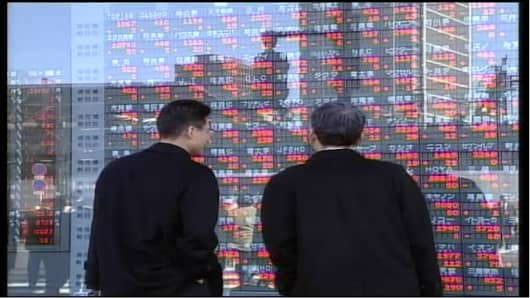Asian stocks closed mostly higher following choppy trading conditions Monday, with markets seesawing between the black and red. Japan managed to finish higher despite the shaky session.
Tokyo's Nikkei 225 Average climbed 0.7 percent to a nearly five-month closing high as Mizuho Financial Group and other financials surged on expectations of higher earnings and growing optimism that the credit crisis is fading. Additional upward impetus came from Sony and other exporters rising on a slightly weaker yen, with money also flowing into stocks from the Japanese government bond market after JGB futures plunged.
Seoul shares closed lower after oscillating throughout the session, with higher-than-expected inflation data driving down shares but solid domestic export figures lending the index some
support. Exporters such as Hynix Semiconductor closed weaker.


